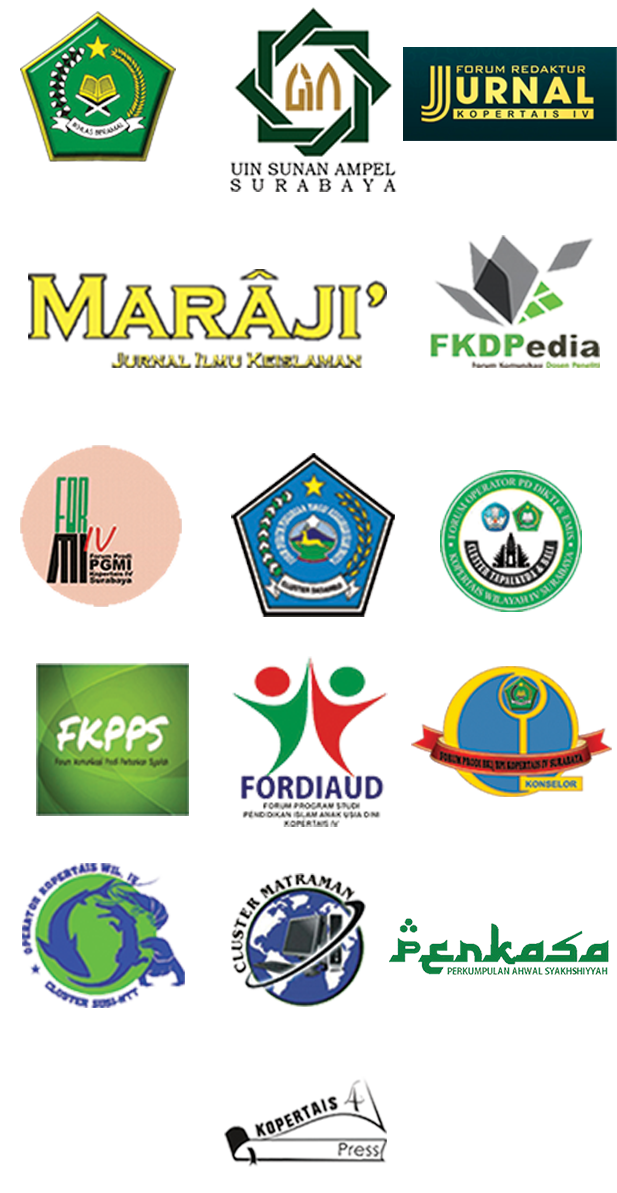Pengarusutamaan Nilai-Nilai Islam Moderat Melalui Revitalisasi Pancasila dalam Pendidikan Islam
Abstract
The occurrence of socio-religious conflicts recently is mainly due to a failure in dialogue understanding of religion with a plural and multicultural Indonesia context. The actors behind the conflict are Islamic fundamentalist groups or groups who insist on their Islamic ideology. They demanded that Indonesia become an Islamic state by applying law and system of government in accordance with the shari'ah of Islam as a whole and comprehensive. On the other hand, Muslim groups belonging to mainstream Islamic organizations (Muhammadiyah and NU) and nationalists opposed it. As a result there was a clash of identities and ideologies at the same time. In order to maintain the moderate values of Indonesian Islam, Islamic educational institutions are required to play their role in strengthening moderate Islam through the "Indonesianization of Islam". The role that Islamic education institutions can perform in this area is to internalize the values of moderate Islam through the revitalization of Pancasila in the lives of learners. This revitalization can be done in two levels, namely theoretically and praxis. Theoretically it is necessary to improve the quality and quantity of research and study of Pancasila, positioning Pancasila as an open ideology, and integrating moderate values in Pancasila with materials or teaching materials. Practically, Pancasila revitalization can be done in four aspects, namely the formulation of Islamic education policy, reorientation of vision and curriculum, filtering of teaching and learning materials, contextualizing learning and control and evaluation which is comprehensive and sustainable.
Downloads
References
Bagir, Zainal Abidin. “Pengantar” dalam Mohammad Iqbal Ahnaf dkk. (ed.). Praktik Pengelolaan Keragaman di Indonesia Kontestasi dan Koeksistensi. Yogyakarata: Program Studi Agama dan Lintas Budaya (Center for Religious and Cross-cultural Studies/CRCS) Sekolah Pascasarjana, Universitas Gadjah Mada. 2015.
Fachrudin, Azis Anwar. Polemik Tafsir Pancasila. Yogyakarta: CRCS (Center for Religious and Cross-cultural Studies) Progam Studi Agama dan Lintas Budaya Sekolah Pascasarjana Lintas Disiplin, Universitas Gadjah Mada. 2017.
Hasanah, Iva dan Abdul Fatah. “Suara Simpang Kasus Sampang: Konflik Sunni-Syi'ah Perspektif Perempuan” dalam Mohammad Iqbal Ahnaf dkk (ed.). Praktik Pengelolaan Keragaman di Indonesia Kontestasi dan Koeksistensi. Yogyakarta: Center for Religious and Cross-cultural Studies/CRCS) Sekolah Pascasarjana. Universitas Gadjah Mada, 2015.
Ichwan, Moch. Nur. “MUI, Gerakan Islamis dan Umat Mengambang”. Maarif Vol. II, No. 2 Desember. Jakarta: Maarif Institute for Culture and Humanity. 2016.
Maarif, Samsul. Pasang Surut Rekognisi Agama Leluhur Dalam Politik Agama di Indonesia. Yogyakarta: CRCS (Center for Religious and Cross-cultural Studies) Progam Studi Agama dan Lintas Budaya Sekolah Pascasarjana Lintas Disiplin, Universitas Gadjah Mada. 2017.
Ruslan, Idrus. “Membangun Harmoni Kehidupan Berbangsa dan Bernegara dengan Nilai Islam dalam Pancasila”. Junal TAPIs. Vol. 9. No. 2. Juli-Desember. Bandar Lampung: IAIN Raden Intan. 2013.
Suharto, Toto. “Gagasan Pendidikan Muhammadiyah dan NU Sebagai Potret Pendidikan Islam Moderat di Indonesia”. ISLAMICA; Jurnal Studi Keislaman. Vol. 9. No. 1. September. Surabaya: Kopertais IV. 2014.
Suharto, Toto. “Indonesianisasi Islam: Penguatan Islam Moderat Dalam Lembaga Pendidikan Islam di Indonesia”, Al-Tahrir, Vol. 17. No. 1 Mei. Solo: Fakultas Tarbiyah dan Ilmu Keguruan IAIN Surakarta. 2017.









